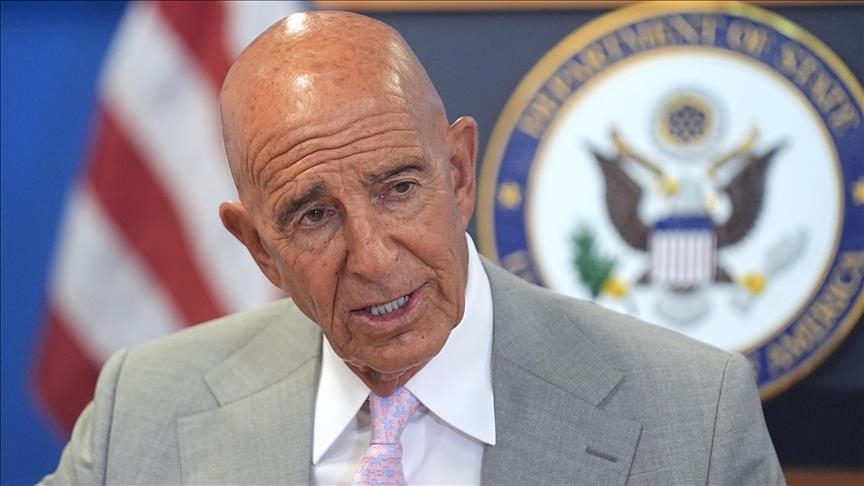US envoy urges Lebanese to ‘keep hope alive’ amid talks on disarming Hezbollah
Tom Barrack says US continues mediation, calls Hezbollah disarmament an ‘internal matter’

BEIRUT / ISTANBUL
US Special Envoy to Lebanon and Syria Tom Barrack on Tuesday affirmed the continued American efforts to stabilize the region, calling on the Lebanese people to “keep hope alive.”
His remarks came during a 75-minute meeting with Lebanese Parliament Speaker Nabih Berri in Beirut, which he described as “excellent,” as they discussed political and security developments in Lebanon and the broader region.
“The meeting was excellent. We are pushing forward to achieve stability, and you (the Lebanese people) must remain hopeful,” Barrack said in his comments published by Berri’s Facebook page.
When asked by reporters about the US administration's refusal to provide Lebanon with guarantees that Israel will respect the current ceasefire, Barrack replied: “It’s not about guarantees. We are dealing with the situation, and everything is progressing.”
“Hope is essential. We are trying to move forward. The goal is regional stability,” he added.
On Monday, after meeting Lebanese Prime Minister Nawaf Salam, Barrack reiterated Washington’s position that it considers Hezbollah “a terrorist group,” but acknowledged that disarming the organization is “a deeply internal matter.”
The US diplomat also received a comprehensive memorandum from Lebanese President Joseph Aoun outlining commitments Lebanon made as part of last year’s ceasefire deal with Israel.
On June 19, Barrack proposed a roadmap to the Lebanese government that included the disarmament of Hezbollah's military wing in exchange for Israel’s withdrawal from five border positions, and the release of international aid for reconstruction.
The plan also calls for fiscal and economic reforms, border security enforcement, crackdowns on smuggling, and stricter oversight of public infrastructure and customs collection.
Barrack’s current visit marks his third to Beirut since unveiling the proposal in June.
In a televised interview on June 27, Barrack said Hezbollah's military structure “must be dismantled,” distinguishing it from the group’s political wing and urging a timetable for disarmament.
Hezbollah Secretary-General Naim Qassem has repeatedly rejected the US proposal.
“Those calling for the resistance to disarm must first demand an end to the Israeli aggression. It is unacceptable to ignore the occupation and only pressure those resisting it,” he said in a July 4 speech.
“Those who choose surrender must bear their own consequences. We will not accept that path,” he added.
Cross-border warfare between Israel and Hezbollah in Lebanon escalated into a full-scale war in September 2024. Despite a November ceasefire, Israeli forces have conducted near-daily attacks in southern Lebanon, claiming to target Hezbollah’s activities.
Since then, Lebanese authorities have reported nearly 3,000 Israeli violations of the truce, including the deaths of at least 257 people and injuries to more than 560.
Under the ceasefire deal, Israel was supposed to fully withdraw from southern Lebanon by Jan. 26, but the deadline was extended to Feb. 18 after Tel Aviv refused to comply. Israel still maintains a military presence at five border outposts.
Anadolu Agency website contains only a portion of the news stories offered to subscribers in the AA News Broadcasting System (HAS), and in summarized form. Please contact us for subscription options.







